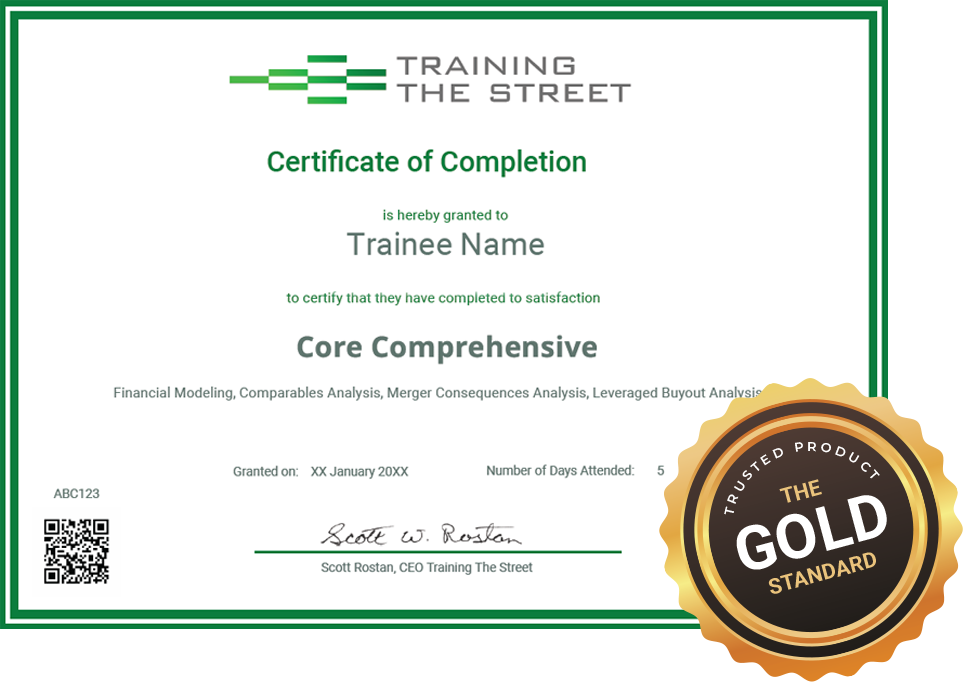
Learn techniques we teach around the world...
Oriented around interpreting financial results of companies to gain a solid understanding of financial statements, the goal is to demystify financial disclosures and use practical tools to efficiently unpack the numbers. This turn-key perspective combined with TTS’s teaching expertise, provides the optimal blend of accounting instruction needed to prepare participants for success—not as accountants but as well-rounded financial professionals.
Our Public Courses weave together classroom lecture, in-class exercises, and critical thinking skills providing the real-world, practical applications of the standards and methods that a professional needs.
Led by our experienced instruction team of former practitioners, you get a unique blend of industry insight combined with a passion for teaching. The average TTS instructor has been part of the team for 8.5 years.
What you will learn?

Financial Statement Analysis
Accounting Fundamentals:
- The structure of financial statements
- Overview of assets, liabilities, equity, revenues, and expenses
- The fundamental accounting equation (A = L + E)
- Income Statement
- Balance Sheet
- Cash Flow Statement
- Key links between the core financial statements
- Understanding the auditor’s report
- Accrual accounting and the Matching principle
- How business transactions are reflected in the financial statements
Income Statement:
- Income Statement presentation formats
- Accrual accounting and link between earnings and cash flow
- Revenue recognition
- Principal vs. agent and other revenue complexities
- Cost of goods sold vs. Selling, general, and administrative expenses
- Other income and expenses and taxes
- Normalizing earnings for non-recurring items
- Margin calculations
- EBITDA, EBIT, Net income and EPS
- EBITDA as proxy for operating cash flow and potential pitfalls
- Marginal and effective tax rates
- How business transactions are reflected in the financial statements
- Key differences between IFRS and US GAAP
Balance Sheet:
- Current vs. noncurrent assets and liabilities
- Cash and cash equivalents, investments in debt and equity securities
- Definitions of working capital, operating working capital and the cash cycle
- Working capital items (receivables, inventories, prepaid expenses, accounts payable, accrued expenses, and deferred revenue)
- Capitalization of expenditures: asset or expense?
- Property, plant, and equipment, capital expenditures, and depreciation
- Difference between identifiable intangibles and goodwill
- Finite life vs. indefinite life intangibles and amortization
- Account analysis using BASE analysis (inflows and outflows)
Financial Statement Analysis
Balance Sheet Continued:
- Provisions and reserves (liabilities)
- Funding the business with debt vs. equity
- Key debt and equity transactions and terms
- Calculation of net debt
- Difference between authorized, issued, and outstanding shares
- Common stock, par value, and additional paid-in capital accounts
- Share issuances and repurchases
- Dividends and interest payments
- Key differences between IFRS and US GAAP
Cash Flow Statement:
- The components of the Cash Flow Statement (example inflows and outflows)
- Why the Cash Flow Statement is a reconciliation of two Balance Sheets
- How to divide a company’s Balance Sheet into operating, investing, and financing activities
- Direct and indirect methods of cash flow presentation
- Detailed steps to constructing an indirect method Cash Flow Statement
- Construct an indirect method Cash Flow Statement from two Balance Sheets and an Income Statement
- Interpreting the Cash Flow Statement and key cash flow ratios
- Key differences between IFRS and US GAAP
Ratio Analysis:
- Discussion of ratios which are most important to various financial statement users
- Common sizing
- Growth rates
- Returns and DuPont analysis
- Profitability ratios and margins
- Activity ratios (turnover, days, and cash conversion cycle)
- Liquidity ratios (working capital, current ratio, quick ratio)
- Balance sheet and income leverage ratios
- Coverage ratios
- Use of ratios in credit analysis
Accounting Complexities
M&A Accounting:
- Accounting rules for equity investments
- Passive equity investments
- Equity method investments (associates / affiliates)
- Full consolidation
- Noncontrolling interest
- Consolidation of Balance Sheet and Income Statement
- Impact of an M&A transaction on earnings
- Goodwill calculations
- Goodwill impairment test
- The impact of deal financing
Income Taxes:
- Permanent differences
- Statutory and marginal rates
- Effective rate
- When to use each tax rate
- Discussion of common permanent differences
- Rate reconciliation and review of firms’ tax disclosures
- Temporary differences
- Common causes of deferred tax assets and liabilities
- Flow of deferred taxes in the core financial statements
- Review of firms’ tax disclosures and classification in the Balance Sheet
- Impact of tax law changes (time permitting)
- Loss carryforwards and carrybacks (time permitting)
- Key differences between IFRS and US GAAP
Leases:
- Lessee accounting under IFRS 16 and ASC 842 (US GAAP)
- Key differences between IFRS and US GAAP (single vs. dual classification models)
- Balance sheet
- Nature of right-of-use assets and classification
- Nature of lease liabilities and classification as debt or operating liabilities
- Income statement
- Depreciation/amortization of the right-of-use asset
- Interest expense on lease liability
- Rent expense for US operating leases
- Account analysis using BASE analysis (inflows and outflows)
- Cash flow statement
- How rent payments reflected in the IFRS and US GAAP Cash flow statements
- Understanding the repayment of the principal portion of lease liabilities
- Financial analysis
- How are lease expenses reflected in profit margins?
- Adjusting EBIT and EBITDA to resolve comparability issues
Share-Based Compensation:
- The logic of expensing Share-based compensation
- Measuring the fair value of share-based awards
- Black-Scholes model
- Expensing the fair value of share-based awards
- Earnings and cash flow statement impact
- Key differences between IFRS and US GAAP
IFRS vs. US GAAP:
- Similarities and philosophical differences between the two GAAPs
- Key differences, including:
- Presentation differences in the core financial statements
- Recognition and reversal of expenses
- Leases (for lessees)
- Pensions and other amounts charged to Accumulated other comprehensive income
- Disclosure requirements
Discontinued Operations and Restructurings:
- Impact of discontinued operations on the financial statements and disclosures
- Exit costs
- Severance costs
- Litigation and similar expenses
- Impairments of tangible and intangible assets
- Key differences between IFRS and US GAAP
Included Self-Paced Activities
Time Value of Money:
- Time value of money
- Discount rates
- Present value calculations
- Future value calculations
- Annuities
- Practice exercises
- Financial calculator guide
Sources of Public Information:
- Guide to basic public filings with the SEC
- Key parts of Forms 10-K and 10-Q
- SEC filing guidelines
- Non-GAAP measures
- SEC Form 8-K triggering events
- How to read a press release
- Sources of public information in other leading jurisdictions
Notes, MD&A, and Oversight:
- Important note disclosures for finance professionals
- Strategies on how to read a set of financial statements
- Strengths and weaknesses of MD&A
- Comparison of GAAP notes and MD&A
- Global accounting standards and helpful resources to understand GAAP
- Roles and responsibilities of management, auditors, and regulators
- Types of audit opinions and examples
What Does A Day Look Like?
Who Is This Course For?


Course Details
What’s Included
Schedule
Prerequisites
How Do You Like To Learn?

Flexible Learning Options
Our courses are available in both in-person or virtual classroom formats. If you learn better in your own space or traveling isn’t convenient, virtual is great solution. Either way, you get the skills and support you need to succeed.

Course Pricing
Cancellation Policy
See what our students say

Training The Street has been teaching the biggest finance firms for over 20 years. To help unlock your career potential, we offer certificates to provide the recognition you deserve.
After you finish your course, you will receive a certificate which can be easily added to your LinkedIn profile.




















